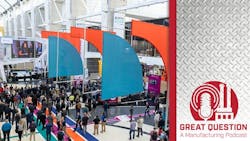Podcast: Top trends from IMTS 2024 — Emerging manufacturing tech, educational innovations, and more
Robert Schoenberger, editor in chief of IndustryWeek; Thomas Wilk, editor in chief of Plant Services; Robert Brooks, editor in chief of American Machinist and Foundry Management & Technology; and Sharon Spielman, Technical Editor at Machine Design, joined over 84,000 other attendees at the 2024 International Manufacturing Technology Show (IMTS) in Chicago, Illinois. This year’s event offers 1.2 million square feet of exhibit space, with 1,816 exhibiting companies and over 7,600 people attending educational events. If you couldn’t make it to this year’s event, don’t worry. We’ve got you covered. In this special episode of Great Question: A Manufacturing Podcast, our editors share what they’ve seen, learned, and experienced live from the show floor.
Below is an excerpt from the podcast:
RS: So, Tom, let's turn it over to you. You've been walking around all day, the past couple days. What have you seen that caught your eye?
TW: You know, it's a huge show, and I think it's interesting because my magazine focuses on the industrial asset management community. At this show, representing are a lot of CMMS companies. And I thought it was interesting that companies like Brightly, Limble, UpKeep, and MaintainX, they are all here to serve the market that IMTS serves, which is machine cutters, metal cutters, and additive manufacturing. I think one of the interesting things that I learned is that the market for CMMS services to manage your work orders, to manage your maintenance work, to develop an online history, this is a market which is really right for that kind of service. There are lots of people who may not have their critical assets, their CNC machines, stored in the CMMS. I've heard a lot of stories of people who, when they’ve put their work orders together, they've used pen and paper, or they stack up the sheets of paper on the corner of a desk and simply pass them out. This is a market which is being served very well by these automated work order management systems.
The other thing that I've noticed is that we do a lot of content focused on compressed air systems, the systems that power other machines. I visited Kaeser Compressors today, as well as Sullair/Hitachi Global Air Power, and both of those companies have some interesting products they are rolling out. Kaeser is focusing these days especially on adding sensors to their compressor equipment to help these machinists understand better the quality of the air that's powering these other assets, whether there is water getting into the air, whether there's oil from the compressor getting into the air. Kaeser is now well on the way to offering this monitoring as a service as part of their compressor offerings.
RS: Everyone wants to be a service these days. No one wants to sell a product when you only get the money once. You have to have an ongoing revenue stream.
TW: Yeah. And the kind of machines that are being showcased at this event especially are very delicate, very complicated machines. The kind of machines that, once you do get a contaminant upstream into the machine, it’s really difficult to clean the machine and restore it to its original operating condition. So Kaeser especially was on the ball with trying to help these companies get ahead of that curve and avoid people having to go into these delicate machines to mess with them. You know, it's sort of a truism in reliability that the more people that touch the asset, the more flaws you're going to introduce into the asset. So, the whole idea is to prevent the contamination from getting into the asset in the first place.
To that point, Sullair was focusing on a new model oil-free rotary screw compressor especially for food and beverage, chip manufacturing, pharma, any environment where you need a clean environment to keep oil from getting downstream into the product.
RS: You talked about the traditional audience for the show as being the metal cutters. This show has always been about machine tools, machining centers, cutting tools, and it still is. There's still a lot of those here. But there's so many different kinds of companies here too. The automation section is larger than it used to be. Same with additive manufacturing. What really caught my eye is we're seeing the names Google and Microsoft and Amazon Web Services on the floor. These giant tech companies are now trying to stake a claim to being in the manufacturing sector.
TW: You know, some of the CMMS companies that I've talked to are focused on how to combine data sets. That's still an issue. Breaking data out of their silos and figuring out what we can learn from combining these sets, whether it's time series data on top of machine health data, or other kinds of data. Cory Dickens over at Brightly was thinking about ways to use work order information to serve other elements of the business. I talked to him for about an hour yesterday about this. He says there's a role for work order data when it comes to serving finance and risk management, for example, that people are just trying to walk down the path.
I also want to call out MaintainX. They just launched a new product called Asset Hub, and it's an interesting sort of central clearinghouse for them to collect a lot of manuals from OEMs and have them in their CMMS for use by anybody who does use MaintainX. They can call up the product manuals for the assets that are being worked on. They can call up job plans if they're prewritten for those assets, but also the OEMs can go in and update these job plans and manuals as needed too. So, it goes both ways. If a customer needs access to the manuals, they can go in there and take a look, but also the OEMs can keep their information up to date for MaintainX users. So that was a new way of seeing various kinds of data that maintenance managers need all assembled in one place. You know, some people need to go in, and some people need to pull the data out.
About the Podcast
Great Question: A Manufacturing Podcast offers news and information for the people who make, store and move things and those who manage and maintain the facilities where that work gets done. Manufacturers from chemical producers to automakers to machine shops can listen for critical insights into the technologies, economic conditions and best practices that can influence how to best run facilities to reach operational excellence.
Listen to another episode and subscribe on your favorite podcast app
About the Author
Robert Schoenberger
Robert Schoenberger has been writing about manufacturing technology in one form or another since the late 1990s. He began his career in newspapers in South Texas and has worked for The Clarion-Ledger in Jackson, Mississippi; The Courier-Journal in Louisville, Kentucky; and The Plain Dealer in Cleveland where he spent more than six years as the automotive reporter. In 2013, he launched Today's Motor Vehicles, a magazine focusing on design and manufacturing topics within the automotive and commercial truck worlds. He joined IndustryWeek in late 2021.

Thomas Wilk
editor in chief
Thomas Wilk joined Plant Services as editor in chief in 2014. Previously, Wilk was content strategist / mobile media manager at Panduit. Prior to Panduit, Tom was lead editor for Battelle Memorial Institute's Environmental Restoration team, and taught business and technical writing at Ohio State University for eight years. Tom holds a BA from the University of Illinois and an MA from Ohio State University
Robert Brooks
Robert Brooks has been a business-to-business reporter, writer, editor, and columnist for more than 20 years, specializing in the primary metal and basic manufacturing industries. His work has covered a wide range of topics, including process technology, resource development, material selection, product design, workforce development, and industrial market strategies, among others. Currently, he specializes in subjects related to metal component and product design, development, and manufacturing — including castings, forgings, machined parts, and fabrications.
Brooks is a graduate of Kenyon College (B.A. English, Political Science) and Emory University (M.A. English.)
